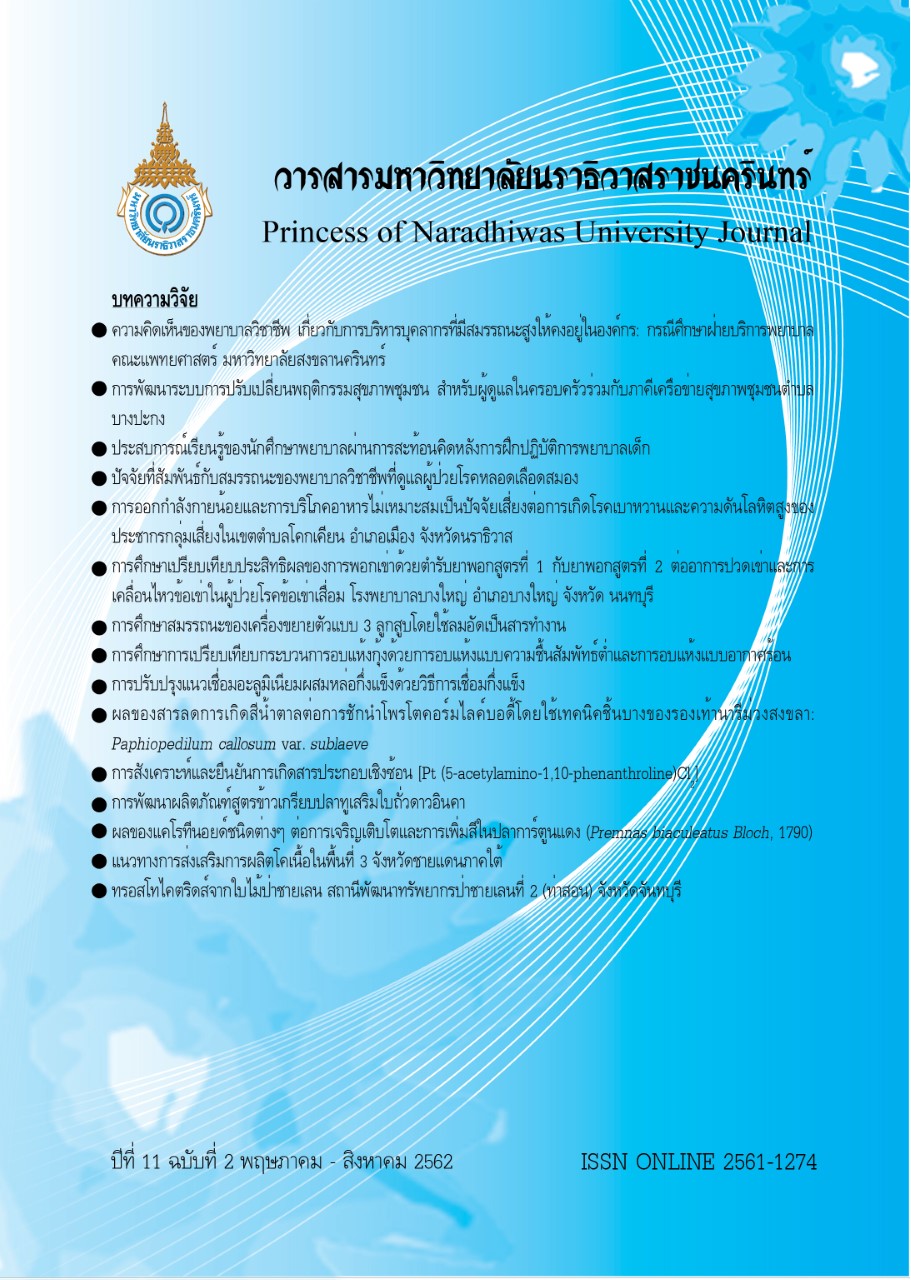The Effect of a Parental Participation in Child Care Program on Anxiety and the Parental Role at a Pediatric Intensive Care Unit
Keywords:
Anxiety, Parental Participation in Child Care Program, Parental Role, Pediatric Intensive Care UnitAbstract
The purposes of this quasi-experimental study (pretest-posttest control group design) were to
examine the effects of parental participation into a child care program on their level of anxiety and parenting roles at a pediatric intensive care unit. Purposive sample was 50 parents of children who had been
on endotracheal tubes and respirators, being admitted at the Songklanagarind Hospital between October
2016 and April 2017. Participants were assigned into one experimental and one control group (25 in each).
Samples from experimental group received a parental participative child care program. Those in control
group received routine care. Research instruments for data collection were questionnaires, including: 1)
demographic data, 2) the State Anxiety Inventory Form Y-1 (Thai version) used to assess parental anxiety,
and 3) the index of the parental roles. Content validity of the research tools was validated by three experts.
Reliability of the questionnaires (The State Anxiety Inventory Form Y-1, and the index of parental role) was
tested using Cronbach’s alpha coefficient, yielding values of .85 and .82, respectively. Data were analyzed
by using independent t-test, as well as an analysis of covariance with pre-test anxiety score as a covariate
The results showed that 48 hours after admission, parental anxiety mean score in the experimental
group was significantly lower than in the control group (p < .01). Parental role mean score in the experimental group, measured 72 hours after the admission, was also significantly higher than in the control group (p < .01). This study concluded that a parental participation in child care program could reduce parental anxiety, and increase the parental roles at a pediatric intensive care unit. Therefore, provision of the parentalparticipation in child care program should be encouraged as a routine nursing practice.
References
Aksornsri, A., Thampanichawat, W., & Wichiencharoen, K. (2012). Effects of concrete objective information on parental anxiety and parental paticipation in care for children in pediatric intensive care unit. Journal of Nursing Science, 30(2), 80- 89.
Asumpinzup, U. (2001). The parental role in caring for children with congenital heart disease. Thai Journal of Pediatrics, 1(2), 6-11.
Chanwatana, B., Jintanadilok, N., Apanakapan, P., Chalamket, W., & Melnyk B.M. (2001). Effect of information intervention on mather’sanxiety level during their children’hospitalization. Thai Journal of Pediatric Nursing, 1(2), 26-36.
Cohen, J. (1988). Statistical power analysis for the behavioral sciences (2nd ed.). HillS.D.ale, New Jersey: Lawrence Erlbaum.
Curley, MA.Q., & Mayer E.C. (2001). Caring Practices:The impact of the critical Care Experience on the family. In Curley MA.Q and Moloney-Harmon PA. Critical care nursing of Infants and Children. Philadelphia: W.B.Saunders Company.
Isarachot, N. (2014). The Effect of a Maternal Participation in Child Care Program on Maternal Stressor at a Pediatric Intensive Care Unit. Master thesis. Prince of Songkla University. (in Thai)
Kapan, K. (2009). Parent, participation in Care for Children in intensive care unit and Factors Associate. Master thesis Chiang mai University. (in Thai)
Karen, S.P., & Jeffrey, S.R. (1999). Family presence during invasive procedures in the pediatric intensive care unit. Archives of Pediatric & Adolescent Medicine, 153, 955-958.
Keawvichit, N., & Thajeen, K. (2007). Knowledge and the parental role in caring for children with heart disease. Songklanagarind Medical Journal, 25(4) 273-282
Lam, L.W., Chang, A.M., & Morrissey. (2006). Parents’experience of participation in the care of hospitalized children: A qualitative study. International Journal of Nursing Studies, 43(5), 535-545.
Marlow, D.R., & Redding, B.A. (1988). Pediatric nursing. Philadelphia:W.B. Saunder
Medical Record of Songklanagarind Hospital. (2014). Statistic of patient admit in intensive care unit songklanagarind hospital. Songkla:Songklanagarindhospital. (in Thai)
Melnyk, B.M. (1995). Parental coping with childhood hospitalization:A theoretical framework to guide research and clinical intervention. Maternal-child nursing journal, 23(4), 123-131.
Maliloon, P., Rutchanagul, P., & Muensa, W. (2016). Impact of a self care development programme for school age thalassaemic children and their caregivers, ability on the children,s self care behaviour. Thai journal of nursing council, 31(2), 52-68.
Rattanapibun, K., Kongsaktrakul, C., & Patoomwan, A. (2011). Parent Participation in the Care of Hospitalized Children. Ramathibodi Nursing Journal, 17(2), 232-247.
Singkla, P. (2007). Effects of nursing mutual participation of mothers on maternal stress and role in caring for critical premature babies [master thesis]. Khon Kaen: Khon Kaen University. (in Thai).
Schepp, K. (1995). Psychometric assessment of the preferred participatation scale for parent of hospitaled children. Unpublished manuscript: University of Washington, School of Nursing, Seattle,WA.
Speilberger, C.D., Gorsuch, R.L., & Lushene, R.E. (1970). STAI manual. California: Consulting Psychologists Press, 20-21.
Vaicheta, S., Chaisirimongkullab, T., & Pookboonmee R. (2008). Advanced pediatric critical care nursing. Bangkok: Mahidol University




